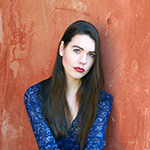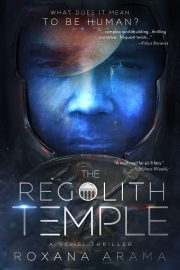Brood For Thought: On The Enduring Appeal Of The Moody Male Lead
by Rosalind Moran
 Works of Science-Fiction and Fantasy routinely suffer genre snobbery. Clichés are identified down to an infinitesimally small degree, and then torn apart with grim satisfaction. Neither unlikely boys with great destinies nor elderly men of genealogical significance are spared.
Works of Science-Fiction and Fantasy routinely suffer genre snobbery. Clichés are identified down to an infinitesimally small degree, and then torn apart with grim satisfaction. Neither unlikely boys with great destinies nor elderly men of genealogical significance are spared.
It’s a tough time to be an archetype.
Yet while authors are aware of heightened scrutiny and increased demands on originality within genres framed by convention, they nevertheless continue to write certain characters – such as male leads – in forms often adhering to well-worn moulds. Take the dark, troubled hero: he remains prominent in stories ranging from Twilight (pardon my language) to A Game Of Thrones, even if these have supposedly grown more nuanced since the I-carry-five-foot-swords-on-my-back era of the 80s.
And why is this the case? The moody male lead is widespread throughout all genres, but it can be difficult to see why anybody would want to spend time with him. He’s brooding, exceedingly individualistic, melancholic, and disposed to hanging around outdoors during thunderstorms for no good reason beyond cultivating his mystique. Furthermore, despite possessing attributes such as introspection, sophistication in some form, and intelligence, he is also typically rather unpleasant.
So what’s underpinning his enduring presence and appeal in fiction?
Even fiends have feelings
For all that the troubled hero of furrowed brow is regularly unpleasant to the point of rudeness, he is generally portrayed empathetically. Everyone knows Heathcliff, for example, is vengeful and destructive; yet his resentment stems from mistreatment, and he really is devoted to Cathy. This complexity underlying his vindictive cruelty humanises him. Indeed, tortured hero figures are often rendered endearing – even identifiable – in such manners, especially through tales of past suffering.
That both readers and writers can empathise with such figures, however, does raise uncomfortable questions. Namely: why do we keep returning to this variety of character? And what effect might brooding heroes’ stories have on real-life views?
I Need A Hero…?
Gender and gender roles are key to understanding the appeal of the tortured hero for both men and women. This is especially true when one considers how troubled men of the ‘tall, dark, and handsome’ variety – which serves as the figure’s archetype – are so often embroiled in sexual tension and romantic subplots.
Essentially, such heroes embody wish-fulfilment for people of both genders (from a heteronormative perspective, at least).
From a male perspective, the brooding man of fiction cultivates appeal with readers through being fascinating and powerful. People around him – attractive women especially – seek to nurture the goodness of his deeply individual soul, and to understand his complex, unjustly maligned self. What’s more, no matter how uncommunicative or unpleasant his behaviour, he never ceases to intrigue: perfectly sensible female characters find themselves drawn in by the mystique of his prickly exterior (hello, Jane Eyre). They forgive mood swings and anti-social tendencies. Not a bad deal.
From the female perspective, meanwhile, the brooding hero’s allure is also clear. Similar to how men might appreciate the character for his powerful presence, women are arguably also drawn to power – and find the prospect of the influence they hold over such heroes to be highly appealing. Attractive women often become the greatest treasure and greatest weakness of the moody male lead: he will go to great lengths to adhere to his love interest’s moral code, and to prove his worth before her. She therefore wields power over him.
What’s more, part of what makes the female love interest special is that she is the first and only girl – excepting some wistful, long-haired, sad-eyed beauty in a tragic backstory – to capture the hero’s heart. This renders the brooding man even more appealing, for his love for this girl is exceptional, and thus perceived as having more value. A nicer, more balanced male character would probably be nice to everybody; the brooding hero, however, in typical ‘bad boy’ style, is nice to that one girl alone, because he can recognise that she is ‘different’ and special’. Such a tie between characters flatters and appeals to female readers, generally positioned by authors to relate to – and inhabit – the character of the female love interest. Little wonder brooding heroes can be such fun to read about if the very basis for their motivations is the worship of some beautiful girl, who in turn worships them.
…Don’t walk off hand-in-hand into the melancholic twilight just yet though.
When Norms Turn Nauseating
Fiction reinforces cultural norms. In light of this, authors must consider what impact inclusion of brooding heroes in stories can have on readers’ attitudes.
For men, mysterious tortured heroes can create unattainable and unhealthy real-life goals: not measuring up to the allure of the brooding hero could inspire misplaced feelings of inadequacy. The behavioural model perpetuated by such heroes is also inaccurate in its representation of functioning relationships – in reality, self-absorption is rarely tolerated, and the attention of attractive females is not a right. Indeed, brooding heroes such as the aforementioned Heathcliff arguably exemplify toxic masculinity: namely, the pressure on men to be sexually aggressive and emotionally distant, particularly when interacting with women. Such concepts of masculinity are detrimental to everybody.
Female audiences, meanwhile, also risk being negatively influenced by the relationships about which they read. Stories of uncommunicative men who just need to be understood by the right woman can encourage real-life women to tolerate all sorts of emotional abuse and manipulation at the hands of male partners, through a misplaced desire to ‘fix’ them. The truth, however, is that brooding and wrathful men in reality are rarely hiding hearts of gold. If they’re repeatedly being rude and horrible, they’re probably just nasty people. Yet the perpetuation of the fantasy of brooding men in stories can impact what women see as acceptable in relationships.
Ultimately, stories have power, and authors must be conscious of this when writing. Why might you have created a brooding hero? And what are the power dynamics of his relationships?
What subliminal stories are speaking through your words?
•••
Rosalind Moran is an Australian writer and student who has spent much of the past year learning Mandarin in Taiwan. Her non-fiction has been published on various websites and online journals, and her creative work has been included in several print anthologies, including the upcoming Kindling III. She enjoys polyglottery and obscure etymological facts. Further details of her publications can be found at www.ganymedesmirror.blogspot.c


